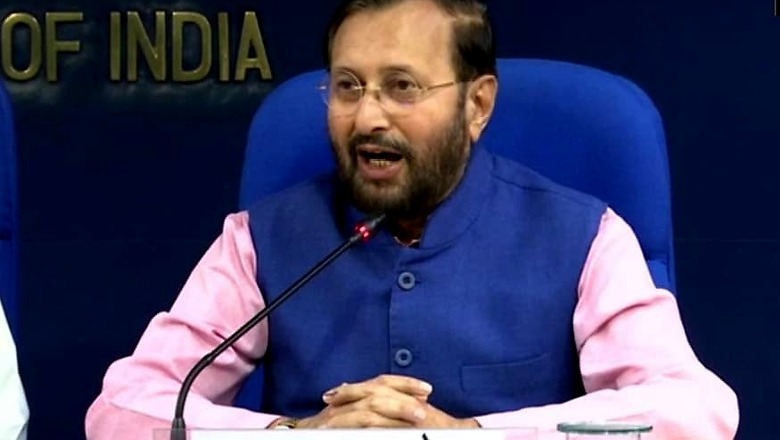
views
Beijing: Environment ministers of the BASIC countries have called for "comprehensive" implementation of the Paris climate deal amid threats by US President Donald Trump to withdraw from it.
They also called on the developed nations to deliver on their commitment to provide USD 100 billion climate finance to the developing countries to mitigate losses suffered in the implementation of the climate action plan.
Environment Minister Prakash Javadekar, who attended the 29th BASIC (Brazil, South Africa, India and China) ministers' meeting here on Saturday, said the meeting worked out priorities and issues as a group to be highlighted at the UN Climate Change Conference to be held in Chile in December.
"The meeting is successful. Practically we had no issue where there was difference of opinion among the four countries," Javadekar told the Indian media here on Saturday.
The Chile meeting will discuss the implementation of the Paris deal to cut the greenhouse gas emissions as well as mitigation, adaption and climate finance.
China and the US are listed as top polluters of the world. While both the countries signed the accord, it ran into problems after President Trump threatened to pullout of the deal signed by his predecessor Barack Obama.
Trump said on Saturday that the US will definitely withdraw from the Paris deal, which he described as a "bad deal." He claimed that his pro fossil fuel policies had made the US an energy superpower, BBC reported.
The US pullout will take effect next year, the day after the 2020 US presidential election, assuming that Trump is re-elected, it said.
Javadekar said the main issue is that developed countries should keep up their annual commitments for the USD 100 billion climate fund which aims to mitigate the least developing countries to manage climate change issues as the Paris agreement comes into effect.
"The developed world has promised USD 100 billion per year till 2020," he said, adding that only about USD 10 to 20 billion has been contributed so far.
"Cost of combating climate change results in trillions of dollars but USD 100 billion is goodwill gesture to help the very least developed countries," he said.
A joint statement released after the BASIC ministers' meeting said the "Ministers emphasised the faithful and comprehensive implementation of the Paris Agreement, in particular of its goals and principles."
They "underlined the importance of a full, effective and sustained implementation of the UN Framework Convention on Climate Change (UNFCCC), its Kyoto Protocol and its Paris Agreement, in accordance with the principles of equity, common but differentiated responsibilities and respective capabilities (CBDR-RC)," it said.
They urged developed countries to propose the new collective quantified goal on finance as soon as possible, including detailed roadmap and timetable.
"The goal should be from a floor of USD 100 billion per year, significantly publicly funded and of greater transparency. The 2020 deliberations should draw lessons from the experience of meeting the USD 100 billion pledge," the joint statement said.
It also said the BASC countries have been implementing ambitious climate action based on their national circumstances and have achieved great progress with significant contribution to global efforts in combating climate change.
"In 2018, China has reduced carbon dioxide emissions per unit of GDP by 45.8 per cent from the 2005 level, increased the share of non-fossil fuels in primary energy consumption to 14.3 per cent.
"South Africa has recently implemented carbon tax, and announced massive renewable energy program in its latest electricity plan. India has already achieved 21 per cent reduction in emission intensity of GDP in 2014 compared to 2005 levels, thereby achieving its pre-2020 voluntary target," the statement said.
"In 2015, Brazil had already achieved a 58 per cent emission reduction in the business as usual scenario set for its NAMAs, thereby overachieving its target of 36 per cent- 39 per cent reductions set for 2020," it said.
Javadekar said he has invited China to join India's initiatives, the International Solar Alliance (ISA) and Ccoalition for Disaster Resistance Infrastructure (CDRI). The CDRI was announced by Prime Minister Narendra Modi at New York last month.
Besides Javadekar, the meeting was attended by China's Minister of Ecology and Environment LI Ganjie, China's Special Representative on Climate Change Affairs Xie Zhenhua, Brazil's National Secretary for International Relations Roberto Castelo Branco and Chief Director of International Climate Change Relations and Negotiations of South Africa Maesela Kekana.



















Comments
0 comment